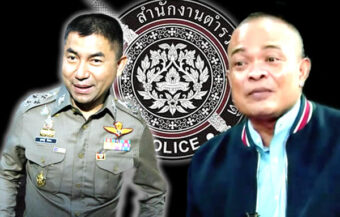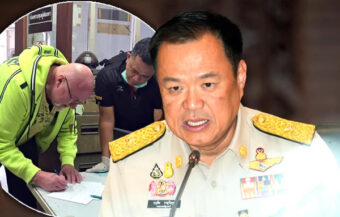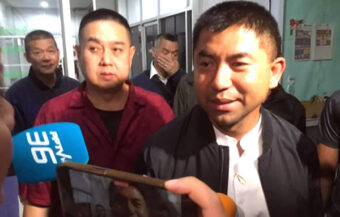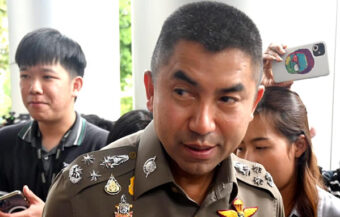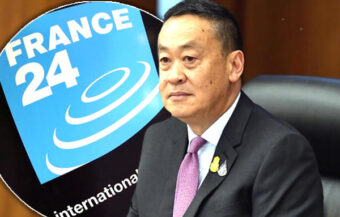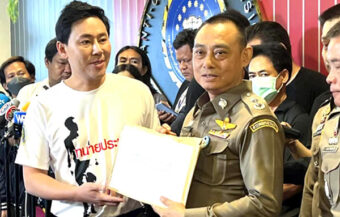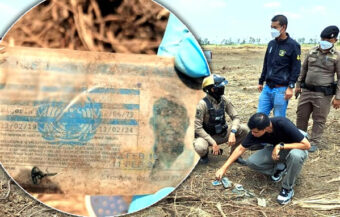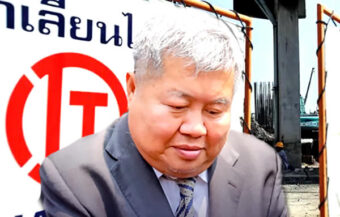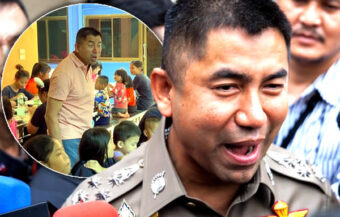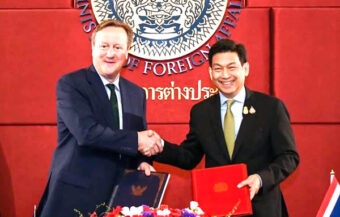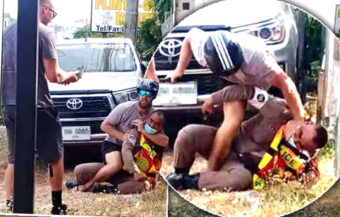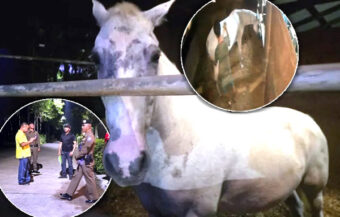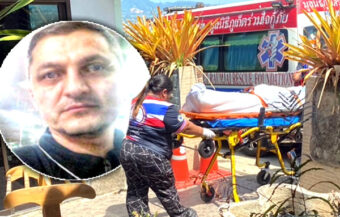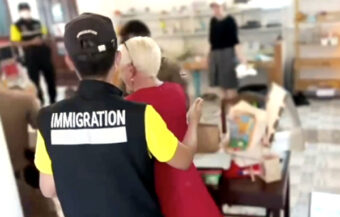Elderly foreigner expats arrested at the Pattaya Bridge Club in February still face a lengthy legal ordeal until a Thai court finally adjudicates on the case. The 32 Bridge players are still technically on police bail. In an unusual move, the players have had their passports returned. The expats were previously led to understand that a more serious charge of illegal gambling would be dropped by authorities.
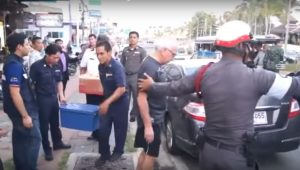
The prosecution of the 32 elderly Bridge players has been confirmed by a District Chief in Pattaya following the raid. The move came as a surprise to many who had expected police to drop the case against the players. This decision means that the elderly group must wait for their day in court.
Pattaya official: Bridge Club case may set a precedent
The District Chief in Pattaya, responsible for the raid, carried out under a search warrant from the Pattaya Provincial Court, has explained that he would prefer the whole issue to be aired before a judge. The Thai official indicated he felt that a precedent may be set which would encourage others playing card games to find ways to flout Thailand’s laws which prohibit gambling. It is understood that the Pattaya Bridge Club will vigorously contest the charges which also may have general implications for the playing of Bridge in Thailand. It is reported that they will point to a 1960 legal provision which specifically excludes Duplicate Bridge, the game being played on the day of the raid, from the charges being presented by Thai authorities.
Meanwhile the President of the Pattaya Bridge Club, 74 year old Jeremy Watson, is facing additional charges in relation to the activities of the club itself. The club boss has also had a higher level of bail set by the Thai authorities, understood to be 50,000 baht. These charges allege offences relating to Thailand’s Card Playing Act of 1935 and the serving of alcohol on the premises outside the provisions of the licence in place at the time.
Quiet afternoon in Pattaya for expat club disturbed
It was a quiet laid back Wednesday afternoon in Pattaya. In a quiet room above a restaurant, older western expats are concentrating on a card game which requires considerable mental agility. Welcome to the Pattaya Bridge Club. Founded by former British Honorary Consul, Barry Kenyon, twenty years ago, the Club is playing a version of Bridge called Duplicate Bridge. This requires a computer system to record the scores at each table. Bridge is an official sport in Thailand, registered with the Thai sports authority. The room is quiet. Mr Kenyon has described the game of Duplicate Bridge as requiring similar ‘mental agility to chess’ and lying ‘at the borders of human cognition in its higher reaches’. Then three officials appear at the top of the stairs, one with a warrant card. The players play on, they have had police enquiries and inspections before. But soon the room bustles with police and military in fatigues. After a while it becomes clear that they are going to arrest everyone for being involved in illegal gambling. The Pattaya Bridge Club has, rather surprisingly, found itself at the heart of Thailand’s crackdown on vice and corruption.
Thailand’s expat foreigners in headlines all over the world
The arrest of 32 elderly foreigners in Pattaya on February 3rd 2016 made headlines all over the world. Most of the commentary was somewhat humorous. It obviously looked like an over reaction by the Thai police and authorities. In fairness, it always appeared that the Thai authorities were polite even though the intent initially appeared very serious. In fact, it is reported that the media was alerted to the raid in advance. Pictures of elderly foreigners sitting at tables surrounded by officials, police and even soldiers dressed in their battle fatigues were soon seen on social media. The story spread to TV and newspaper coverage particularly as the foreigners originated from a spread of western countries.
Club’s system may have heightened suspicion of Thai police
The former British honorary consul Barry Kenyon is the holder of an MBE. He described the raid in February as a ‘ordeal’ for members of the club, all of whom are elderly expats from western countries. In an interview with the UK’s Daily Telegraph newspaper, he revealed that the Bridge club’s computer system may have aroused the suspicion of those in authority following a tip off that the club was a venue for illegal gambling. ‘They saw the computer we have to record each player’s bridge record and must have thought that something big was going on,’ he said. ‘It was all quite absurd’. Through the intervention of an influential figure in Thai and Asian Bridge activities, it appeared that the club was eventually able to convince reluctant Thai law enforcement officials that the scene was not being used for gambling.
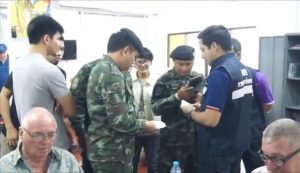
But then the officials raised other matters such as the legality of the playing cards on the premises and other provisions of the law. ‘Once the crucial gambling charge was shown to be silly, the spotlight obviously shifted to secondary issues such as too many packs of cards, the significance of legislation passed during the Japanese occupation in 1943 and pondering whether a glass of beer on a side table between 2pm and 5pm is a criminal offence or not,’ Mr Kenyon said in response to the Nation newspaper, an English language newspaper in Thailand, nearly two weeks after the raid. He was at pains to point out that he was not questioning Thai civilian and police authorities in the pursuit of their duties.
British man questions the arrest of ‘vulnerable’ 80 year olds
In a letter to the Nation newspaper, the British man, who is still represents the UK as Corresponding Counsel in Pattaya questioned whether the raid, which saw ‘vulnerable old ladies in their 80s’ arrested for twelve hours in the glare of the international media, was an overreaction or a misunderstanding. He pointed out that the club has been in existence in Pattaya for twenty two years. The Pattaya Bridge club operates from a room above a restaurant in Pattaya, the seaside resort which is home approximately 7.5% of foreigner expats living in Thailand.
Key to the raid is Thailand’s fight against vice and corruption
It is now understood that the robust raid was sparked by a complaint either to the Office of the Thai Prime Minister or the Thai Interior Ministry. The tip indicated that that the venue was being used for illegal gambling. Pattaya has developed quite a reputation, both in Thailand and internationally, as a base for illicit activities associated with foreigners. Thailand is the midst of a genuine government crackdown on corruption and vice. Gambling is near the top of the list. Indeed this may provide a key to a possible explanation for how the raid came about. The serious nature of gambling, as a vice which threatens the very fabric Thai society, is difficult for foreigners to grasp. One theory is that the tip off to the Thai authorities came from a Thai woman possible with an axe to grind against a western man with links to the Bridge Club. Bridge Club founder Barry Kenyon has said that the club is aware of the source of the tip and described it as ‘most doubtful’. The story highlights the danger foreigners in Thailand face if denounced or accused to police by a third party. The Thai legal process is quite different to western countries in many respects. A key difference is that more offences are treated as criminal as opposed to civil matters in western legal systems.
Thailand’s problem with illegal gambling
It has also emerged that the raid was not the first enquiry by police into the activities of the Pattaya Bridge Club which were always cleared up when the game was explained to local officials. It is believed that Royal Thai Police officers on this occasion may have suspected that the computer system installed at the bridge club had been part of some scheme whereby monetary again could be had by those taking part so as to constitute gambling, which is illegal in Thailand. Thailand has a very serious problem with gambling. Many Thais have become addicted to the vice and illegal gambling dens are operating throughout the country. One of the key aims of the government installed by the military coup in 2014 is to clean up Thailand and this includes purging the country of its gambling underground.
Pattaya Club President recalls arrests by Thai law enforcement
Another British man, Jeremy Watson was in charge when the police raid occurred on the Bridge club. The seventy four year old took over as President when Barry Kenyon retired. Mr Watson revealed that when police first arrived on the scene on Wednesday afternoon, the 3rd of February 2016, the bridge club members did not panic. The group carried on playing as there had been a similar raid three months previously. Thailand, and in particular the Pattaya and Jomtien area, has become very popular in the last few decades as a retirement location. The 32 individuals on the day of the raid included 12 players from the United Kingdom, three Norwegians, three Swedes, two Australians as well as Dutch, German and Danish players.
‘We thought the SWAT team had arrived,’ Jeremy, who has lived in Thailand since 1969, recalled when the extent of the raid became apparent. ‘I expected that as the pack leader I might get hauled off,’ he told the Voice of America. I did not expect the whole group to be hauled off. Jeremy explained the workings of the Bridge club’s computer system and the role it plays in the game of Duplicate Bridge. The club computer system was subsequently taken by Thai authorities as evidence, loaded into vehicles in the midst of the high profile raid.
Elderly German woman had ‘guts’ says Bridge Club President
The raid saw the arrest and detention of the Bridge club members. They were taken by the Thai police to a local station in a police wagon and were charged with gambling as well lesser offences. At the station it is understood that all the expats were finger printed and had mug shots taken as is normal procedure. The group were not however confined to cells. The atmosphere was cordial and the very elderly or those on medication were released early. However the ordeal for the elderly bridge players continued after this when they were required to pay 5,000 baht each as bail. The foreigners were only released from police custody at 3am the following morning. A German woman was the last offender in custody on Thursday, refusing to sign a lenghty gambling confession in Thai as a prerequisite to being granted bail for 5,000 baht (approximately $150).’ I respect her because I feel like I should have done the same, but I didn’t have the guts,’ said Watson later.
Thai police and law enforcement genuinely misunderstood
An influential Thai woman is credited with apparently having the more serious gambling charges dropped by police against the 32 Bridge players arrested. However this may now be in doubt. Khunying Chodchoy Sophonpanich is Thai President of the Asian Pacific Bridge Federation. She became involved in the matter at short notice. In an interview with Voice of America’s Thai bureau after the raid, she accepted that the group were not involved in illegal gambling. ‘No, of course they were not up to anything illegal. There was a misunderstanding,’ Esther Sophonpanich said. Her intervention on behalf of the foreigners may have been critical as Thai police and authorities were genuinely under the wrong impression. Ms Sophonpanich offered a viable explanation for this suggesting it was a cultural difference. ‘There’s still a misconception that if you use cards you are gambling,’ she told Bangkok bureau for Voice of America (VOA). ‘Of course, in many countries in Asia it seems to be like that.’ The Bridge supremo stressed that Bridge in Thailand was an activity that did not involve gambling and that her organisation was anxious make this clear. ‘We are trying to build up the popularity of the game here and it is very important that it is not linked to gambling.’ Ms Sophonpanich seemed to be confirmed in this view by a deputy spokesperson for the Thai government. In an interview with The Guardian newspaper in the UK, Maj Gen Werachon Sukhondapatipak attributed the bridge club police raid to ‘a misunderstanding’. ‘We are trying to suppress gambling but locals (in Pattaya) don’t understand the bridge game,’ he said. He confirmed the return of passports to the Bridge club members.
Pattaya’s reputation for sleaze and illicit activity
Unfortunately for respectable retirees such as those in the Bridge Club, Pattaya has developed a worldwide reputation for sleaze and sex in recent years. This has been compounded by an even more dangerous reputation as a centre for illicit trade and undesirable people linked to crime. The crackdown by the Thai military junta has also involved a crackdown on human trafficking and visa violations. In recent months, this seen police and army stopping foreigners leaving clubs and bars in order to check their passports and visa status.
Respectable profile of the 32 foreign expats arrested in Pattaya
The group arrested by the police included respected Bridge players from Australia, Norway as well as a retired chartered accountant and corporate financial controller. The absurd nature of the incident was described by Mr. Kenyon to the national UK newspaper, the Daily Telegraph, as he painted a portrait of an elderly woman in a walking stick climbing aboard one of the police wagons to be taken to the police station and the elderly group being supplied with essentials from a local Seven Eleven and with the cooperation of the police. Mr. Kenyon also revealed that the groups had to assemble again in the police station the next day and were to be taken in buses to the local courts when news arrived that the gambling charges were being dropped.
Charges still pending against the Pattaya 32
An investigation is still continuing primarily focusing on violations of the Thai Playing Cards Act of 1935. This law stipulates that no more than 120 cards can be used at any one time and also the fact the cards were not stamped for duty purposes. However it is understood that the Bridge Club have argued that the cards being used were supplied by members of the club and brought into Thailand perfectly legally. The club itself is also facing possible prosecution in relation to the serving of alcohol on the premises and it is not clear if gambling charges are still being purused despite indications to the contrary.
It is also understood that in the aftermath of the raid, the Pattaya Bridge Club applied for a new licence in respect of cards and the premises. The club liaised with the authorities to clarify matters and put everything in order. The Pattaya Bridge Club’s website, taken down after the raid, has now returned and the club appears open for business as normal.



